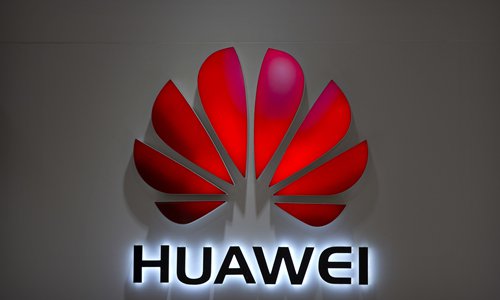HOME >> BUSINESS
Australia won't take side in US-China trade war
By Chen Qingqing and Bai Yunyi Source:Global Times Published: 2019/11/3 20:15:17
Focus on areas of mutual benefit, not differences: officials

Huawei logo File photo: IC
Australia will not pick a side in the ongoing US-China trade war, Australian officials said, despite uncertainty about whether the country would allow China's Huawei to build its 5G network.
It's no surprise that from time to time, China and Australia have different views but both sides need to keep their differences in perspective and focus on their vast common interests, Elizabeth Peak, deputy head of mission of the Australian Embassy in China, told the Global Times during the 6th Edition of the China Inbound-Outbound Forum held in Beijing on Sunday.
Canberra has been on the frontline of the China-US trade war as Australia became the first state in the Five Eyes intelligence alliance to issue security guidelines in August 2018 to its telecoms carriers, urging them to reject Huawei. The country has been criticized as "a pawn" for the US in its global campaign to curb Huawei.
"China and Australia have very complementary economies," Peak said, noting that they don't have fundamental differences, and bilateral trade has grown on a well-established foundation.
However, it's no surprise that Australia and China have different views from political perspective, but Australia does not see dealing with China or with the US "a binary choice," the official said. "We'll be continuing constructive cooperation with both countries," she added.
Huawei has urged the Australian government to allow it to be a 5G equipment provider in the country, as its exclusion from the country's 5G roll-out will make that process 20 to 40 percent more expensive than the rest of the world, the company said in a statement sent to the Global Times.
It also said it is committed to "a robust framework of safeguards, checks and balances" to ensure that its broadband technology could only be used in Australia's national interest and economic wellbeing, the statement said.
A tussle over on Huawei on a global scale has become a major issue entangled with trade tensions between China and the US.
In spite of political divergences, China and Australia have had robust trade relations over the years. China remained Australia's largest two-way trading partner during 2017-18, accounting for 24.4 percent of Australia's total trade, official data from the Australian authority showed.
Australian business representatives feel confident about striking a balance between handling relations with the US as an ally while maintaining sustainable business ties with China.
"I think the key to managing that really well is to focus on the things that we've got in common and not focus on some of the issues where there might be a difference of opinion," Nick Coyle, CEO and executive director of AustCham in Beijing, told the Global Times on Saturday.
He suggested that both sides focus on things that are mutually productive to overcome short-term problems in the political sphere.